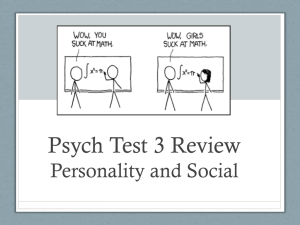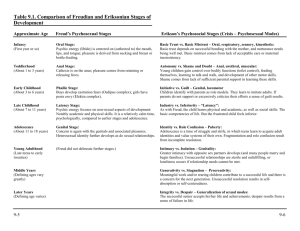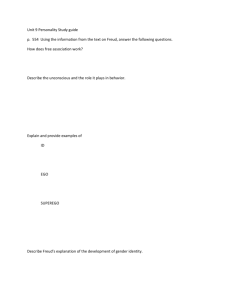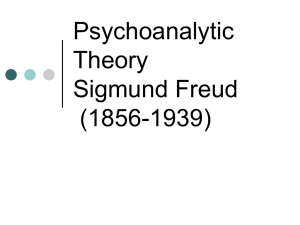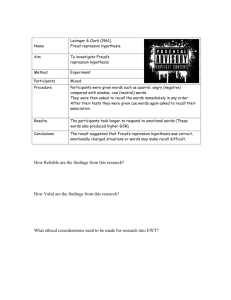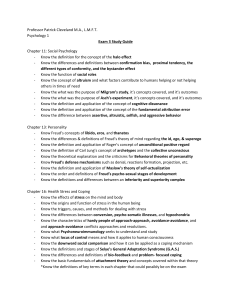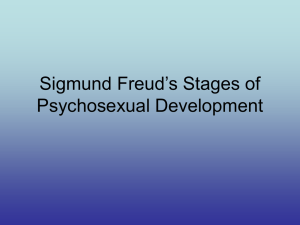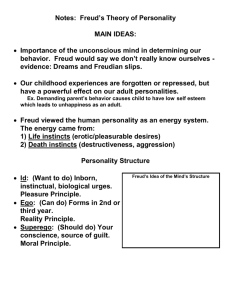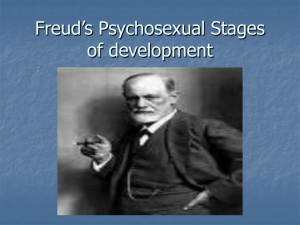AP Psychology - Unit 10 Study Guide
advertisement
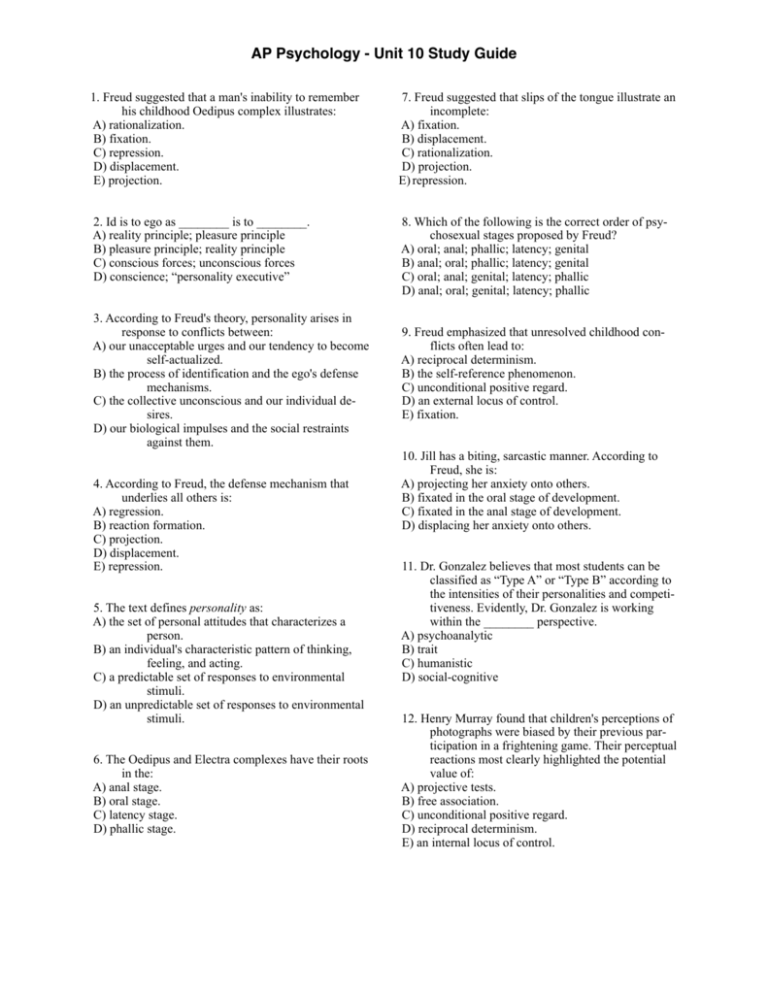
AP Psychology - Unit 10 Study Guide 1. Freud suggested that a man's inability to remember his childhood Oedipus complex illustrates: A) rationalization. B) fixation. C) repression. D) displacement. E) projection. 7. Freud suggested that slips of the tongue illustrate an incomplete: A) fixation. B) displacement. C) rationalization. D) projection. E) repression. 2. Id is to ego as ________ is to ________. A) reality principle; pleasure principle B) pleasure principle; reality principle C) conscious forces; unconscious forces D) conscience; “personality executive” 8. Which of the following is the correct order of psychosexual stages proposed by Freud? A) oral; anal; phallic; latency; genital B) anal; oral; phallic; latency; genital C) oral; anal; genital; latency; phallic D) anal; oral; genital; latency; phallic 3. According to Freud's theory, personality arises in response to conflicts between: A) our unacceptable urges and our tendency to become self-actualized. B) the process of identification and the ego's defense mechanisms. C) the collective unconscious and our individual desires. D) our biological impulses and the social restraints against them. 4. According to Freud, the defense mechanism that underlies all others is: A) regression. B) reaction formation. C) projection. D) displacement. E) repression. 5. The text defines personality as: A) the set of personal attitudes that characterizes a person. B) an individual's characteristic pattern of thinking, feeling, and acting. C) a predictable set of responses to environmental stimuli. D) an unpredictable set of responses to environmental stimuli. 6. The Oedipus and Electra complexes have their roots in the: A) anal stage. B) oral stage. C) latency stage. D) phallic stage. 9. Freud emphasized that unresolved childhood conflicts often lead to: A) reciprocal determinism. B) the self-reference phenomenon. C) unconditional positive regard. D) an external locus of control. E) fixation. 10. Jill has a biting, sarcastic manner. According to Freud, she is: A) projecting her anxiety onto others. B) fixated in the oral stage of development. C) fixated in the anal stage of development. D) displacing her anxiety onto others. 11. Dr. Gonzalez believes that most students can be classified as “Type A” or “Type B” according to the intensities of their personalities and competitiveness. Evidently, Dr. Gonzalez is working within the ________ perspective. A) psychoanalytic B) trait C) humanistic D) social-cognitive 12. Henry Murray found that children's perceptions of photographs were biased by their previous participation in a frightening game. Their perceptual reactions most clearly highlighted the potential value of: A) projective tests. B) free association. C) unconditional positive regard. D) reciprocal determinism. E) an internal locus of control. AP Psychology - Unit 10 Study Guide 13. Suzy bought a used, high-mileage automobile because it was all she could afford. Attempting to justify her purchase, she raves to her friends about the car's attractiveness, good acceleration, and stereo. According to Freud, Suzy is using the defense mechanism of: A) displacement. B) reaction formation. C) rationalization. D) projection. 14. Isaiah is sober and reserved; Rashid is fun-loving and affectionate. The Eysencks would say that Isaiah ________ and Rashid ________. A) has an internal locus of control; has an external locus of control B) has an external locus of control; has an internal locus of control C) is an extravert; is an introvert D) is an introvert; is an extravert 15. According to the psychoanalytic perspective, a child who frequently “slips” and calls her teacher “mom” probably: A) has some unresolved conflicts concerning her mother. B) is fixated in the oral stage of development. C) did not receive unconditional positive regard from her mother. D) can be classified as having a weak sense of personal control. 16. According to Freud, ________ is the process by which children incorporate their parents' values into their ________. A) reaction formation; superegos B) reaction formation; egos C) identification; superegos D) identification; egos 17. For his class presentation, Bruce plans to discuss the Big Five personality factors used by people throughout the world to describe others or themselves. Which of the following is not a factor that Bruce will discuss? A) extraversion B) openness C) independence D) conscientiousness 18. According to Freud, the part of personality that represents our sense of right and wrong and our ideal standards is the: A) collective unconscious. B) ego. C) self-concept. D) id. E) superego. 19. The Big Five personality factors are: A) emotional stability, openness, introversion, sociability, locus of control. B) neuroticism, extraversion, openness, emotional stability, sensitivity. C) neuroticism, gregariousness, extraversion, impulsiveness, conscientiousness. D) emotional stability, extraversion, openness, agreeableness, conscientiousness. 20. Freud referred to a lingering focus of pleasureseeking energies at an earlier psychosexual stage as: A) reaction formation. B) projection. C) fixation. D) displacement. E) repression. Answer Key - Unit10SG 1. C 2. B 3. D 4. E 5. B 6. D 7. E 8. A 9. E 10. B 11. B 12. A 13. C 14. D 15. A 16. C 17. C 18. E 19. D 20. C AP Psychology - Unit 10 Study Guide
